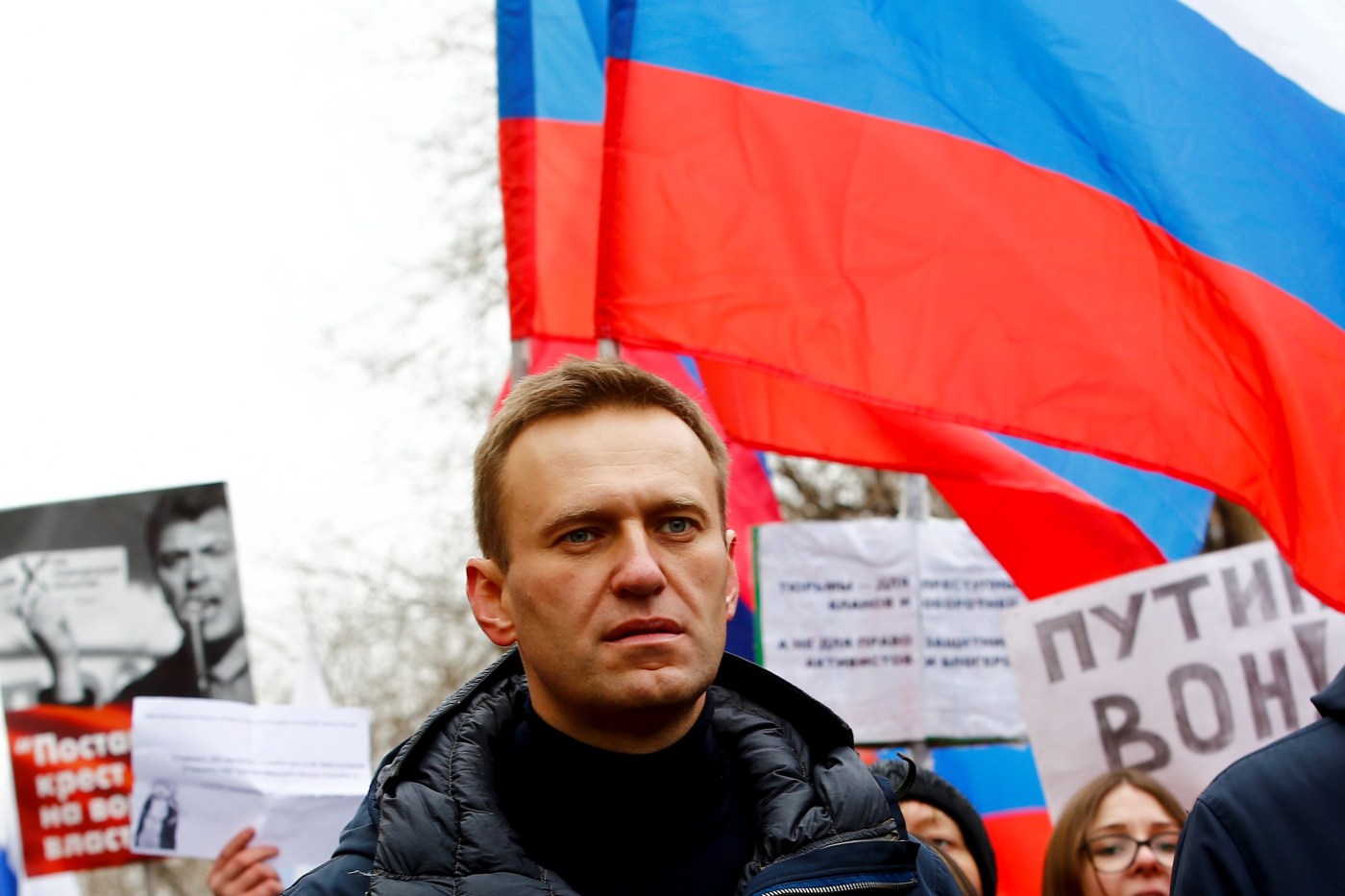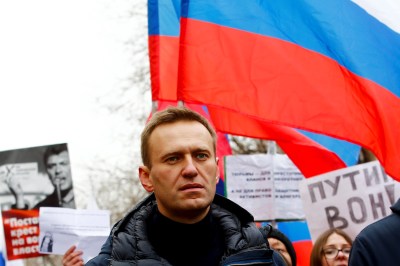On Friday morning, Russian prison authorities announced the death of Russian opposition leader Alexei Navalny. He reportedly had felt unwell after a walk in the courtyard of Penal Colony No. 3—where he had been transferred a few weeks earlier—and lost consciousness. Arriving rescuers’ attempts to revive him were unsuccessful, and Navalny’s team confirmed his death the following day. Though the exact cause of his demise is still unknown—Navalny’s allies have already said he was murdered—there is no doubt the Kremlin bears full responsibility.
People have gathered around the world in recent days to express their grief and anger over Navalny’s death. These gatherings have been small in Russia itself—the state is, per usual, cracking down on protest—but there will be an enduring image from this weekend: People laying flowers—at Navalny’s former home in Moscow, at the memorial for the victims of Soviet repression opposite the FSB headquarters, and in many other places throughout the country. These are acts of individual mourning, of silence, and of loneliness.
Just last week, Russia’s Supreme Court rejected legal challenges from the liberal politician Boris Nadezhdin, reaffirming the Central Election Commission’s decision barring him from next month’s presidential election. Although some suspected him of having made a secret deal with the Kremlin to perform the role of a tolerated and controllable anti-war candidate, Nadezhdin had become a beacon of hope within Russia—the root of his name, Надежда, literally means “hope” in Russian—uniting the otherwise divided liberal opposition and inspiring tens of thousands to offer him their signatures to get him on the ballot. The efforts to keep him from participating in the election were expected, but still a bitter disappointment for many.
Navalny’s death is another, more dramatic symbol of the never-ending brutality of the Russian regime and its wars—both against Ukraine and against its own population. It’s possible, of course, that Navalny’s death was “simply” the result of his torture-like prison conditions. But just as likely is the possibility that the course of events followed a precise script, dictated by the Kremlin and intended to deprive Russian society of all remaining hope.
And indeed, the dominant emotion in Russia today is not anger, but sadness and despair. In a broadcast over the weekend on Dozhd—the online TV channel now based in the Netherlands because independent media is not welcome in Russia—the journalist Mikhail Fishman fought back tears. In Meduza—another Russian-language media outlet based somewhere other than Russia—sociologist Grigoriy Yudin, not known for emotional outbursts, wrote: “In Russia, people like to say that it is darkest before dawn. I think that’s true—only we don’t know the true darkness yet. It looks like it’s starting to get dark. The sun has set.”
Navalny’s rise.
Since his return to Russia and subsequent imprisonment in 2021, Navalny believed his main task was to spread courage. But this role—a screen upon which hope could be projected—was not necessarily predetermined for someone who was largely known for his penetrating sarcasm and his aggressive, scathing criticism.
An admirer-turned-fierce critic of Boris Yeltsin, Navalny began his political career as an anticorruption lawyer for small shareholders and as a campaign manager for the liberal party Yabloko. His rhetorical talent was evident in a debate club he moderated in the early 2000s, and he began to develop political ambitions of his own, eventually drifting into Russia’s nationalist movement against the advice of his friends. He quickly parted ways with the movement—possibly because it did not earn him the following he had hoped for—but he did not make a hard break with its political messages.
Purely by electoral standards, Navalny’s greatest political success came in 2013, when he finished second in Moscow’s mayoral elections, securing 27 percent of the vote. That vote signaled to the regime that it was time to end the strategy with which it had tried to present Navalny as the symbol of an unhindered yet always losing liberal opposition. Repression increased.
But the real highlight of Navalny’s political oeuvre was his 2018 presidential campaign. He was barred from the ballot, of course—the Central Election Commission cited a fraud case against him as rationale—but the effort helped him build a nationwide network of supporters for the first time in the history of opposition in post-Soviet Russia. He spearheaded an innovative system of tactical voting (termed “Smart Voting”), which led to successes for local opposition candidates between 2018 and 2020, in a few cases helping to rid United Russia of its majority. The Kremlin’s intense focus on Navalny—the assassination attempt in 2020, the imprisonment in 2021, the complete destruction of his organization—make clear that he and his team were the most potent opposition force Putin has ever faced.
Not anti-political, but pre-political.
Navalny has been criticized from both the left and the nationalist right for his “liberal naïveté.” Some argued that replacing the Russian elite, reforming the country’s justice system, and making elections competitive would not be enough to truly effect the change that they thought Russia needed. But for Navalny, democracy, anti-corruption, and the rule of law—which were always at the heart of his work—were not anti-political, but pre-political. His goal was always to put together as broad of a coalition as possible, an alliance which, at its core, agreed primarily on its fundamental opposition to the authoritarian and corrupt regime. To even make “normal” political competition possible, Navalny thought, Putin needed to first be dislodged.
Navalny was also criticized for his reliance on personality-driven politics. And of course, as the charismatic leader of his project, Navalny was very power-conscious. His organization was intended to be an example of the efficient institutions that would exist in the “Wonderful Russia of the Future”—a slogan he coined himself—but it was also the personalistic, and at times authoritarian, mirror image of the regime he was up against. His organization, for instance, was a party in all but name—with the important difference that there was no mechanism for the base, the volunteers of the movement, to affect decisions at the top. That said, because Putin’s regime has systematically shut down normal politics—and therefore the formation of stable political coalitions and worldviews—building an opposition movement around a leading figure is not only understandable but likely the most effective strategy.
The return of the collective.
Looking back on his life, Navalny’s greatest achievement is perhaps his fight for self-efficacy—for the idea that one’s actions can actually make a difference. After the wave of protest in 2011 and 2012—which was still dominated by veterans of the Perestroika era—Navalny’s presidential campaign in 2017 and 2018 represented the most significant political mobilization in Russia in decades. Navalny’s team opened about 80 campaign offices throughout the country, with some paid staff and many volunteers. Before 2021, these were places of networking and legal assistance, they were buzzing centers of independent exchange. For many in Russia, that campaign was their first experience of collective action.
The leaders of these centers have long been imprisoned or driven into exile. But thousands of activists carry their skills with them, as well as their longing for a peaceful and democratic Russia. Today, they are laying flowers in Volgograd or Vilnius, likely by themselves. But when they come back someday and work together on the “Wonderful Russia of the Future,” it will be thanks to Alexei Navalny.






Please note that we at The Dispatch hold ourselves, our work, and our commenters to a higher standard than other places on the internet. We welcome comments that foster genuine debate or discussion—including comments critical of us or our work—but responses that include ad hominem attacks on fellow Dispatch members or are intended to stoke fear and anger may be moderated.
With your membership, you only have the ability to comment on The Morning Dispatch articles. Consider upgrading to join the conversation everywhere.